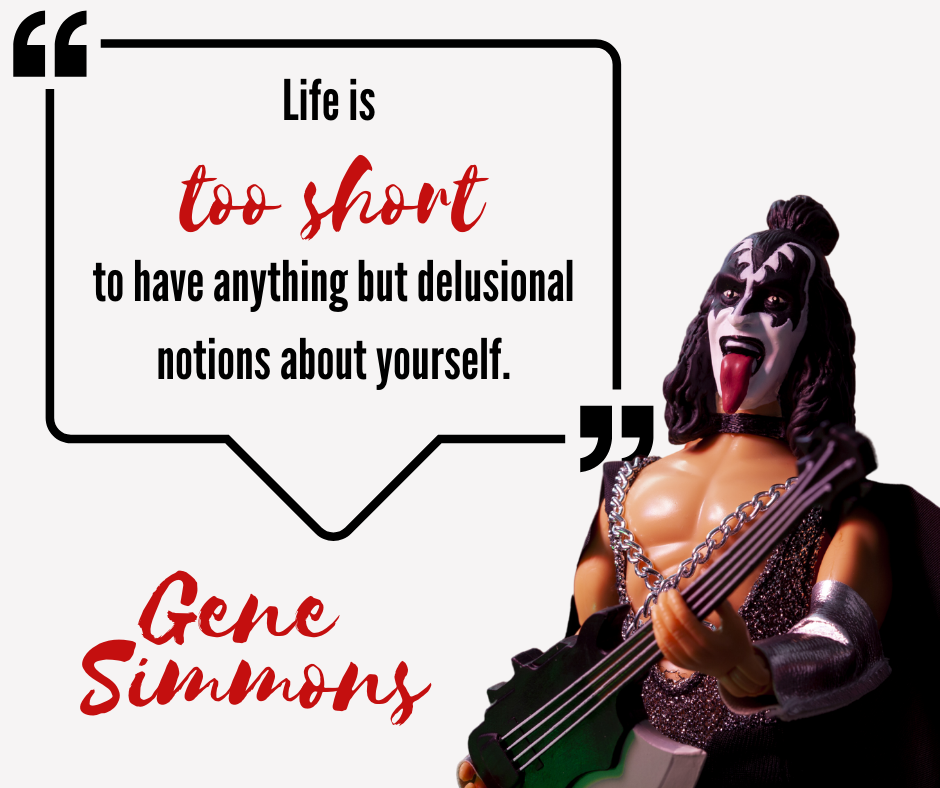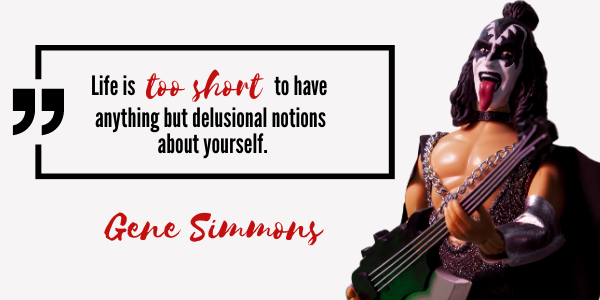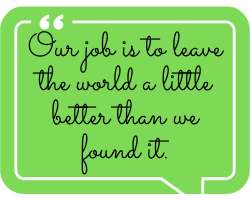
Employees at Michaels get a free psych-x profile (it’s not my area of expertise) to determine personal strengths through Gallup. My top strength is “context,” which means I’m a historian. What does this mean? I observe history, including my mistakes, others’ mistakes, and continuously analyze human nature.
For example, I watched a webinar[1] last week on how to be a “rock star” of success. You’ve heard of others called a “rock star,” right? “Rock star” made lists of overused terms years ago. The presenter said, (paraphrasing) “it doesn’t matter whether the person is a customer, supervisor, owner, or employee; all human beings focus on the following:
- What’s in it for me?
- What’s in it for me?
- What’s in it for me?
Note that “it” is often not financial gain but rather the avoidance of fear and pain.
Another observation of my context is to be open-minded. Too frequently, people assume someone is a clown when they are just the opposite. Consider Gene Simmons of the 1970s rock band KISS. The rock-star webinar leader started and ended with Mr. Simmons.
Decades after thinking, “Wow, these guys are cool,” I learned the genius of Gene Simmons, their lead singer, and founding member. He appears to be a clown on stage, but after seeing him in multiple interviews here and there, I conclude he is a genius. Moreover, what is the secret of his success? He is an insatiable reader of anything he can get his eyes on, including news, non-fiction, or fiction. I relate to that.
 Other interesting things about Gene and KISS: His mother escaped the Nazi concentration camps. The letters SS in their logo for KISS resemble that of the Nazi’s SS unit, which was most responsible for the genocide of millions of beloved Jewish people in the European 1930s-1940s. I find this all to be fascinating. Born to a “dirt poor” family in Israel, he started earning money at age seven, picking wild fruit and selling it. He emigrated with his mother and siblings to New York City. He was a writer before the band(s) launched.
Other interesting things about Gene and KISS: His mother escaped the Nazi concentration camps. The letters SS in their logo for KISS resemble that of the Nazi’s SS unit, which was most responsible for the genocide of millions of beloved Jewish people in the European 1930s-1940s. I find this all to be fascinating. Born to a “dirt poor” family in Israel, he started earning money at age seven, picking wild fruit and selling it. He emigrated with his mother and siblings to New York City. He was a writer before the band(s) launched.
In the 80s, during the “play it backward” heyday, it was also rumored the band was satanic. They were not, but this didn’t bother Simmons because the rumor aided the band. Genius!
I’m a sucker for these remarkable success stories.
Next Generation Programs
Moving on with the theme of history, what’s in it for me, and formulas for success, I participated in a Zoom call via Midwest Energy Efficiency Alliance’s Active Efficiency Collaborative. The core of this: Next-Generation Performance-Based Programs. They present good ideas, and from my experience, I’ll suggest snags for each of these. Remember: what’s in it for me, times three. It is the root of all snags.
#1 Simplify the Customer Experience
A theme I’ve discussed in this blog many times comes from another genius, Val Jensen, who said, “Programs are designed to be evaluated. They are not designed to be effective.” Amen, brother. Once implementers attempt to add ancillary services to make it easy for the customer… eh, eh, eh, eh! That’s too expensive, and the program isn’t “cost-effective.”
I understand where this suggestion comes from – on separate occasions, I’ve had a house and a big garage built for me, and each time, I used one contractor responsible for everything. I probably paid extra, but I didn’t care. My experience: great.
Another piece of #1 is simplifying rates for utility customers. Ok. What does that look like? From outside our industry, an all-you-can-eat plan, like internet data. That is simple, but it is not what they have in mind, for sure. Whether time-of-use or the introduction of demand charges, effective rates are more complicated than the usual flat rates customers are used to. Bet on tons of pushback from consumer advocates and parties representing the elderly and the income challenged.
#2 Support Aggregation of Smaller Projects
Aggregation of smaller projects is part of the Jurassic Dogma of yesteryear. Case in point: fifteen to twenty-five years ago, utilities in the upper Midwest ran performance contracting programs for projects too small for energy service companies (ESCOs) to make cost-effective. Landing performance contracts for ESCOs is cost-prohibitive for all but huge projects such as for large school districts, colleges, and government. Left behind: the vast majority of opportunity.
Utilities have a huge advantage to deliver because they have the relationships and, in most cases, their customers’ trust to cost-effectively execute performance contracts in a market left for dead by the ESCOs. However, overzealous stakeholders, including commissions and consumer advocates, declared utilities could not use ratepayer funds to earn more profit. That is soooo outdated. Get over it. Make it easy, right?
#3 Deep Savings Programs for Large Commercial and Industrial
Number 3 is interlocked with #2 above. Consider strategic energy management programs. I have learned about SEM programs at conferences, read papers on them, and evaluated SEM programs. They are insufficiently comprehensive, and they focus mostly on behavioral, operations, and maintenance measures. What is “strategic” about these things? Zilch.
One successful (depends on your definition of successful) SEM project I evaluated included shutting off lights above a suspended ceiling in a manufacturing facility. They installed the ceiling, but no one decided to turn the lights off so the mice above the ceiling could enjoy their circadian rhythm. Shut off the lights! It saved a few hundred thousand kWh annually. That was the bulk of the project. Strategic? Not so much.
SEM programs need to be STRATEGIC and cover several forward-looking years – at least three, preferably five. That’s how you get deep savings with large C&I customers. You don’t merely find some lights or soda machine to turn off and declare victory.
Closing
I’ll continue to shoot these fish in a barrel next week. Meanwhile, I’ll leave you with another quote from the genius Gene Simmons.
“Our job is to leave the world a little better than we found it.”
Isn’t his quote the definition of sustainability? Yes! It is.

[1] The Rockstar Principles of Success – Find Your Inner Rock Star presented by Dayna Steele and hosted by the Hotel Community Forum
